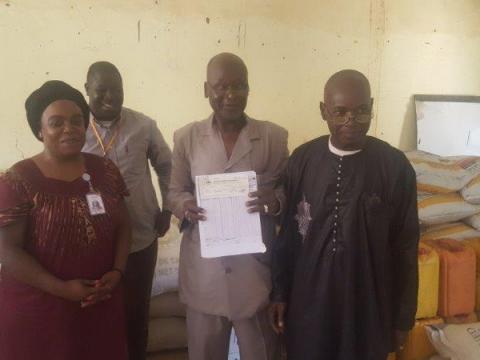Uncompromising: Educating Children in the midst of Crisis

Security in the central and northern regions of Mali have declined gradually since 2012. An increasing number of families are fleeing their homes, due to inter-ethnic conflict and attacks on local authority and institutional structures in areas that are becoming more difficult for humanitarian organizations like World Vision to access.
Families, among them women and school age children, flee leaving behind everything. World Vision has been operational in the area for more than 10 years and was among the early humanitarian responders.
According to the regional education cluster report 80 primary schools were forcibly closed by extremist groups in March 2018. As a consequence, some families have pulled their children out of school for fear of attacks. The extremist groups view state schools as promoting ‘western’ education and values. According to Mr. Adama Dembele, Director of the Educational Animation Center fondly called DCAP (directeur du centre d'animation pédagogique), overseeing 50 schools in the 3 municipalities affected by the crisis (Dinangourou, Yoro and Dioungani), “insecurity is not new in this area, but armed groups targeting schools is a new trend. It emerged in 2016 during the local elections period, where because of several incidents security forces in the area withdrew and become less visible. With attacks on telecommunications infrastructure and increasing fear in the community, we had to close several schools from November 2017 to February 2018.”
Several attempts to reopen schools in the three most affected municipalities have been unsuccessful. Out of 195 teachers, only 50 were able to resume teaching, trusting that security systems had been put in place. This resulted in the resumption of UNICEF support to teacher-training, community sensitization activities and psychosocial support for children affected by the crisis.
After two incidents of aggression, the few remaining teachers stopped going to teach in the affected areas, even though they knew thier salaries would be reduced. Mr. Dembele added, “on the night of November 22 to 23, 2017, a school director and his assistant were attacked and robbed of personal belongings. In December a school director of Yoro municipality was ordered to close his school. After that, the decision was made to close 50 schools, compromising the academic year (2017 -2018) and the future of 7,196 children between the ages of 3 and 18 years." Mr. Dembele admitted, “this was the most difficult decision I have made, during my 20 years in this profession.” After that sad episode, Mr. Dembele was one of the first to offer help to a group of young students affected by the crisis, housing 7 of them in his own house for a short period of time.
When the decision was made to close the remaining schools, a solution had to be found for a group of junior high school students preparing to take their GCSE (General Certificate of Secondary education) exams, locally called “diplômé de étude fundamental” (DEF). Mr. Dembele made several requests for support, by approaching local NGOs present in the area.
World Vision was quick to respond. "World Vision was the first organization to offer support to the young students coming from Dioungani and Yehi municipalities,” Mr. Dembele confirmed. The regional education department relocated 78 students whose schools had been forced to close. World Vision supported the group of students with life-saving kits consisting of food, black boards, chalk, sanitary pads for girls, sleeping mats, hand wash kits, soap and bleach.
World Vision also helped Mr. Dembele and his team to connect with other humanitarian actors, government officials and local associations including a local radio, in order to explain the situation and seek more support. "As a result, people were touched and more support was offered in the form of cash donations,” Mr. Dembele said excitedly.
Asked about the future of his students, Mr. Dembele paused before answering, “well, we hope that the security situation improves to enable us at least to open some schools and extend the academic year to September to compensate the lost period. We should not compromise the future of our young.”
Education is a fundamental right of a child, and it should not be violated and compromised because of conflict, disaster or crisis. The situation in Central Mali threatens to strip children of this fundamental right and we must act now to prevent it.
We hope you will feel compelled to act by providing much needed support to students in Central Mali.